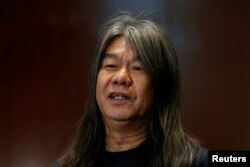Come October, weeks after a new high-speed train hurtles down from mainland China, Hong Kong’s High Court will be busy hearing challenges concerning the new station. Five petitioners say a new law gives China unconstitutional control over a slice of Hong Kong soil because it allows Chinese immigration and border agents to enforce mainland law in the territory for the first time since the handover from British rule in 1997.
With such sweeping authority, critics say, the law means there is nothing to stop Beijing from grabbing more Hong Kong land, under the guise of protecting national security.
The law’s passage was a stinging defeat for pro-democracy activists and marked a major setback in their quest to establish Hong Kong’s autonomy and ensure its civil rights. It was the latest blow in four years of frustrations and fury for pro-democracy activists.
Legal challenges
Earlier this year, many say they were enraged by what they say was pressure applied by Beijing on Hong Kong lawmakers to approve the so-called joint checkpoint plan for the Guangzhou-Shenzhen-Hong Kong express rail. Officials, including Hong Kong chief executive, Carrie Lam, defending the move by saying that granting mainland immigration and border agents the right to check passengers in Hong Kong would speed their travels.
“That opens the floodgates, definitely, to Beijing’s further encroachment to Hong Kong’s higher degree of autonomy,” said Alvin Leung, a Hong Kong lawmaker who, like his fellow democratic activists, voted against the law. “It opens the floodgates for Beijing to sideline the local government’s authority in the name of convenience.”
Members of the city’s pro-democracy camp and the Hong Kong Bar Association said the law that gives mainland officials unconstitutional authority because it essentially ceded Hong Kong territory, in this case, a quarter of the terminal, to China, even though Article 18 of the territory’s constitution bars Chinese law from being used in Hong Kong aside for laws requiring national security and emblems such as the national flag.
The city’s High Court is scheduled to hear five legal challenges to the law beginning in October, weeks after the rail link begins running. The petitions all argue the border plan is unconstitutional.
But the challenges to overturn the law face a tough journey. Tian Feilong, a mainland legal scholar, argues that Hong Kong courts have no right to review a decision made by China’s top legislature.
Beijing pressure
Hong Kong activists, lawyers and human rights workers say the city’s civil freedoms have withered since 2014 when the National People’s Congress Standing Committee’s white paper clarified that the special territory did not enjoy autonomy.
“The central government has the power of oversight over the exercise of a high degree of autonomy in the HKSAR,” the paper reads.
That paper, and a subsequent one that sharply restricted democratic elections granted by the region’s constitution, triggered a 79-day street occupation when tens of thousands of demonstrators sought democratic elections. The government was not swayed.
Indeed, through the courts, the legislature and the media, Beijing has wounded the pro-democracy camp, some activists say. Major protests in 2014, 2015 and 2016 galvanized residents, especially the young. But Beijing would not negotiate with them and then issued new rules that pushed candidates and lawmakers from office, while the Hong Kong government prosecuted more than 100 protesters and the courts created tough restrictions on protesters. This year’s annual July 1 march drew a defiant but much smaller contingent than in past years.
Activist Leung Kwok-hung, a former lawmaker known as “Long Hair,” said that as more residents feel powerless to confront Beijing’s authority, a growing apathy endangers the prospect of the movement’s success.
“We are not entitled to ask any questions about the decision of … the standing committee of the People’s Congress of the PRC,” he said.
Leung was one of four legislators expelled from office last year by a judge after the national legislature set new standards that made his official oath illegal. Some residents feel “you don’t ask questions, since Hong Kong belongs to China. So, whatever Chinese authorities say, you have no more say,” he added.
Other developments also worry some lawyers and human rights activists.
Old laws
Judges have used interpretations of old colonial legislation to imprison former lawmakers and activists who have protested Beijing’s policies. At the same time, British officials were among those who criticized Hong Kong judges who sentenced two activists to prison last month.
One of those activists, Edward Leung, a former legislative candidate who advocated for Hong Kong’s independence, was sentenced for what police say was a riot in 2016. Although he pleaded guilty to what was his first offense, Leung received six years behind bars, a sentence that has been criticized by many lawyers, scholars and officials. More than 100 protesters face prosecution based on a British colonial-era law deployed after 1967 street riots.
Officials in Hong Kong and Beijing have dispatched more messages to urge the city’s residents to stop referring to the territory as a separate entity with an autonomous government, an image Beijing itself promoted especially before Britain’s 1997 handover. In recent years, however, China has asserted its role much more clearly.
At a research conference in July, Wang Zhenmin, chief of China’s legal department of the liaison office in the city, said that the nation will inevitably impose national laws and its constitutional system on Hong Kong.
“Any matters that the [Hong Kong] Basic Law did not regulate, the relevant regulations in the [Chinese] constitution will be applicable to Hong Kong automatically,” Wang said.














